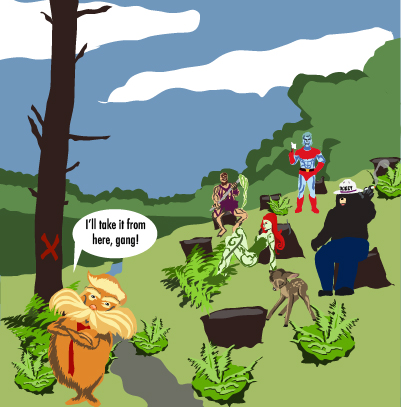
Deforestation is a fatal problem that is choking eeds to be better counter- acted before more damage is dealt.
Protections for the Tongass Forest in Alaska were removed on Oct. 29 when the Trump admin- istration exempted it from Alaska’s Roadless Rule, according to National Geographic. This opens it up for the construction of roads and more.
The Tongass Forest is one of the largest temperate rainforests in the world, according to National Geographic. It is home not only to wild- life and trees that are a thousand years old but to Indigenous communities such as the Haida, Tsim- shian and Tlingit peoples. The forest harbors their food, medicine, art, history and way of life. This decision will impact the environment, local tour- ism and the lives of those who call it home.
According to the United States Department of Agriculture, the Roadless Rule Act puts impor- tant protections for forests in place. It does not completely prohibit the building of new roads and other developments. These can be approved by a USDA Forest Service Line Officer.
The Roadless Rule has had a history of being in and out of effect since its introduction in 2001, the USDA said. And rolling it back now is regres- sive malpractice.
According to Pachamama Alliance, defores- tation contributes to greater levels of greenhouse gases, endangers the plants and animals that live in forest habitats, reduces regulation of the water cycle, creates soil erosion and contributes to flood- ing. Not only that, but it impacts Indigenous com- munities by taking away their resources like food and tourism and damaging their homelands and
way of life. According to Cornered by Protected Areas, Indigenous people contribute majorly to the conservation of forests. Yet their rights are consistently disregarded.
A handful of industries, such as the beef and palm oil industries, are the main drivers behind deforestation, the UCS said. Implementing pre- ventative policies and making informed, effective decisions when it comes to agricultural growth could all help to reduce deforestation. Affordable and realistic solutions exist. Yet over three million square feet of forests are decimated in one minute, according to statistics from One Tree Planted.
There are steps that individuals, including TCC students, can take to counter the effects of deforestation. While no single person can combat the whole scope of deforestation on their own or live a perfectly eco-friendly life, that doesn’t mean people should feel discouraged from taking any small steps they can to create collaborative change.
For college students low on cash, spending isn’t necessary to take action. According to Green- peace, people can make efforts such as stand- ing with and bolstering the voices of Indigenous people, pushing for governments and companies to take action in reducing deforestation and edu- cating themselves and others about issues related to deforestation and climate change. They can also make an effort to reduce waste and use less energy, recycle and purchase recycled products, support environmentally conscious companies and make donations.
Deforestation is a large problem that needs attention on a broader scope. But every indivdual action, no matter how small, is progress.
